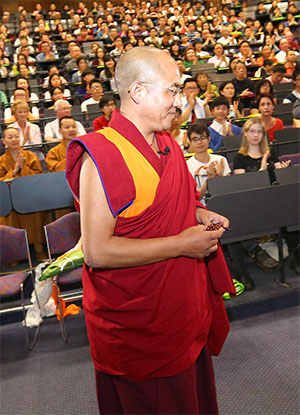Compassion and Happiness: The View of Tibetan Buddhism
In this speech, Khenpo Sodargye Rinpoche tells us that all people, whatever their ethnic and cultural backgrounds, are seeking happiness. Most people think the secret of happiness lies outside themselves. But eternal happiness can only be found within our own mind. Through cultivation of love and compassion, everyone can embrace the bliss of ultimate happiness.
The Difference Between Compassion and Love
Excerpt 1: The One Common Thing in All of Us
Despite the cultural differences and ethnic diversity of people across the globe, we all share a single common wish: to pursue happiness and avoid suffering.
Excerpt 2: The Difference Between Compassion and Love
There is a difference between compassion and love. Worldly love is attached to specific conditions. These often include selfish desire and obsession. In Buddhism, compassion is rooted in a noble heart that embraces the spirit of self-sacrifice and the unconditional desire to help others. Without compassion, suffering is inevitable, since the fulfillment of worldly happiness driven by the attachments of worldly love requires effort. Actually, compassion is not just a Buddhist concept: we should all think seriously about it.
Excerpt 3: The Double Blessing of Compassion
Shakespeare wrote, “Mercy is a double blessing. It blesses the one who gives it and the one who receives it.” How can we acquire the compassion that is so meaningful in our lives and helpful to others? It comes about through study and spiritual practice. As we exercise our body, so we must exercise our spirit. I see people running and exercising in the pursuit for physical health, but good as this is, it is limited. The spiritual achievement of practicing compassion, however, is unlimited—harboring boundless and infinite love.
Excerpt 4: How to Cultivate Compassion?
There was a famous Tibetan Geshe named Potowa. One time a woman came to him and asked, “How can I cultivate my compassion?” The Geshe told her, “Care about all sentient beings just like you care about your own son. This is the way to cultivate compassion.”
Excerpt 5: H .H . Jigme Phuntsok’s Happiness
What is eternal happiness? It is something that has nothing to do with our idea of gain and loss. It doesn’t matter if we are old, young, rich or poor, whatever our situation, we are able to sustain a state of happiness. This is eternal happiness. I remember my guru H.H. Jigme Phuntsok Rinpoche, saying in his later years, “Though my body is becoming older and older, my happiness is always increasing. Whether alive or on the brink of death I am always in a meditative state and feel incomparable happiness.”

The One Common Thing in All of Us
Despite the cultural differences and ethnic diversity of people across the globe, we all share a single common wish: to pursue happiness and avoid suffering.

How to Cultivate Compassion?
There was a famous Tibetan Geshe named Potowa. One time a woman came to him and asked, “How can I cultivate my compassion?” The Geshe told her, “Care about all sentient beings just like you care about your own son. This is the way to cultivate compassion.”
“What is eternal happiness? It is something that has nothing to do with the concept of gain and loss. It is non-conditional. If one is rich or poor, old or young, one can still sustain a state of happiness. This is eternal happiness.”
















